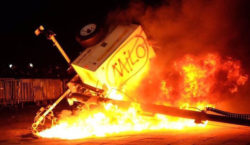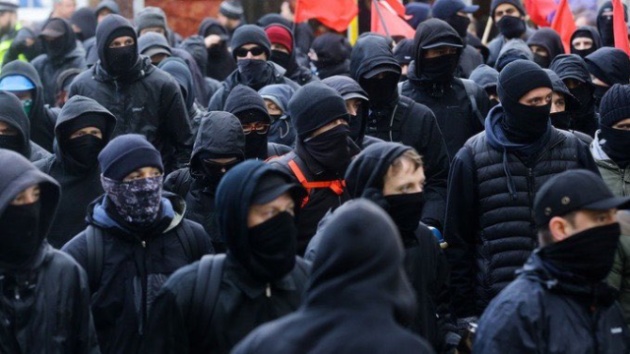New York Times defends Antifa thuggery on college campuses
The thrust of the argument here is that to shut down voices that the Leftist establishment considers odious — which includes mine, although I am not mentioned in this article (no, I am not Richard Spencer) — is aiding the oppressed to have a voice that they are usually denied.
This is an argument for Brownshirt thuggery and/or totalitarian control of the public discourse.
Who will be entrusted with the power to determine whether a group is sufficiently oppressed to be allowed to be heard? Whoever will have that power will be able to impose his or her views tyrannically, with all dissent suppressed.
Moreover, the idea that these oppressed groups have no voice as it is, and conservative speakers coming in would further silence and marginalize them, is sheer Leftist fantasy. In reality, the overwhelmingly dominant point of view on university and college campuses today is that of the hard-Left. Jihad is a response to U.S. imperialism, Muslims are always and in every case oppressed victims of racism and “Islamophobia” — try uttering a word of disagreement to those propositions on a university or college campus today, and see what happens. These idea have near-total dominance on campus today. Letting me speak (and I did speak at Truman State University a couple of weeks ago, and have two more university appearances coming up) or others with dissenting points of view is simply allowing a small opposing word to be uttered amid the relentless and never-ending bleat for the other side.
The New York Times, perhaps realizing that it cannot win with its ideas on a level playing field, has now published here a sly apologetic for totalitarian censorship. To its everlasting shame, although I doubt that Ulrich Baer or the Times editors will notice my indictment amid all the applause they’re receiving for this piece from their peers.
 “What ‘Snowflakes’ Get Right About Free Speech,” by Ulrich Baer, New York Times, April 24, 2017:
“What ‘Snowflakes’ Get Right About Free Speech,” by Ulrich Baer, New York Times, April 24, 2017:
At one of the premieres of his landmark Holocaust documentary, “Shoah” (1985), the filmmaker Claude Lanzmann was challenged by a member of the audience, a woman who identified herself as a Holocaust survivor. Lanzmann listened politely as the woman recounted her harrowing personal account of the Holocaust to make the point that the film failed to fully represent the recollections of survivors. When she finished, Lanzmann waited a bit, and then said, “Madame, you are an experience, but not an argument.”
This exchange, conveyed to me by the Russian literature scholar Victor Erlich some years ago, has stayed with me, and it has taken on renewed significance as the struggles on American campuses to negotiate issues of free speech have intensified — most recently in protests at Auburn University against a visit by the white nationalist Richard Spencer.
Lanzmann’s blunt reply favored reasoned analysis over personal memory. In light of his painstaking research into the Holocaust, his comment must have seemed insensitive but necessary at the time. Ironically, “Shoah” eventually helped usher in an era of testimony that elevated stories of trauma to a new level of importance, especially in cultural production and universities.
During the 1980s and ’90s, a shift occurred in American culture; personal experience and testimony, especially of suffering and oppression, began to challenge the primacy of argument. Freedom of expression became a flash point in this shift. Then as now, both liberals and conservatives were wary of the privileging of personal experience, with its powerful emotional impact, over reason and argument, which some fear will bring an end to civilization, or at least to freedom of speech.
We should resist the temptation to rehash these debates. Doing so would overlook the fact that a thorough generational shift has occurred. Widespread caricatures of students as overly sensitive, vulnerable and entitled “snowflakes” fail to acknowledge the philosophical work that was carried out, especially in the 1980s and ’90s, to legitimate experience — especially traumatic experience — which had been dismissed for decades as unreliable, untrustworthy and inaccessible to understanding.
Milo Yiannopoulos
The philosopher Jean-François Lyotard, best known for his prescient analysis in “The Postmodern Condition” of how public discourse discards the categories of true/false and just/unjust in favor of valuing the mere fact that something is being communicated, examined the tension between experience and argument in a different way.
Instead of defining freedom of expression as guaranteeing the robust debate from which the truth emerges, Lyotard focused on the asymmetry of different positions when personal experience is challenged by abstract arguments. His extreme example was Holocaust denial, where invidious but often well-publicized cranks confronted survivors with the absurd challenge to produce incontrovertible eyewitness evidence of their experience of the killing machines set up by the Nazis to exterminate the Jews of Europe. Not only was such evidence unavailable, but it also challenged the Jewish survivors to produce evidence of their own legitimacy in a discourse that had systematically denied their humanity.
Lyotard shifted attention away from the content of free speech to the way certain topics restrict speech as a public good. Some things are unmentionable and undebatable, but not because they offend the sensibilities of the sheltered young. Some topics, such as claims that some human beings are by definition inferior to others, or illegal or unworthy of legal standing, are not open to debate because such people cannot debate them on the same terms.
The recent student demonstrations at Auburn against Spencer’s visit — as well as protests on other campuses against Charles Murray, Milo Yiannopoulos and others — should be understood as an attempt to ensure the conditions of free speech for a greater group of people, rather than censorship. Liberal free-speech advocates rush to point out that the views of these individuals must be heard first to be rejected. But this is not the case. Universities invite speakers not chiefly to present otherwise unavailable discoveries, but to present to the public views they have presented elsewhere. When those views invalidate the humanity of some people, they restrict speech as a public good.
In such cases there is no inherent value to be gained from debating them in public. In today’s age, we also have a simple solution that should appease all those concerned that students are insufficiently exposed to controversial views. It is called the internet, where all kinds of offensive expression flourish unfettered on a vast platform available to nearly all.
The great value and importance of freedom of expression, for higher education and for democracy, is hard to underestimate. But it has been regrettably easy for commentators to create a simple dichotomy between a younger generation’s oversensitivity and free speech as an absolute good that leads to the truth. We would do better to focus on a more sophisticated understanding, such as the one provided by Lyotard, of the necessary conditions for speech to be a common, public good. This requires the realization that in politics, the parameters of public speech must be continually redrawn to accommodate those who previously had no standing.
The rights of transgender people for legal equality and protection against discrimination are a current example in a long history of such redefinitions. It is only when trans people are recognized as fully human, rather than as men and women in disguise, as Ben Carson, the current secretary of housing and urban development claims, that their rights can be fully recognized in policy decisions.
The idea of freedom of speech does not mean a blanket permission to say anything anybody thinks. It means balancing the inherent value of a given view with the obligation to ensure that other members of a given community can participate in discourse as fully recognized members of that community. Free-speech protections — not only but especially in universities, which aim to educate students in how to belong to various communities — should not mean that someone’s humanity, or their right to participate in political speech as political agents, can be freely attacked, demeaned or questioned.
THE STUDENT ACTIVISM that has roiled campuses — at Auburn, Missouri, Yale, Berkeley, Middlebury and elsewhere — is an opportunity to take stock of free speech issues in a changed world. It is also an opportunity to take into account the past few decades of scholarship that has honed our understanding of the rights to expression in higher education, which maintains particularly high standards of what is worthy of debate….
RELATED ARTICLES:
Italy: Muslim who threatened to “roast non-believers on skewers” arrested
After Palm Sunday jihad massacres, Pope Francis to Egypt to reach out to Muslims




Leave a Reply
Want to join the discussion?Feel free to contribute!